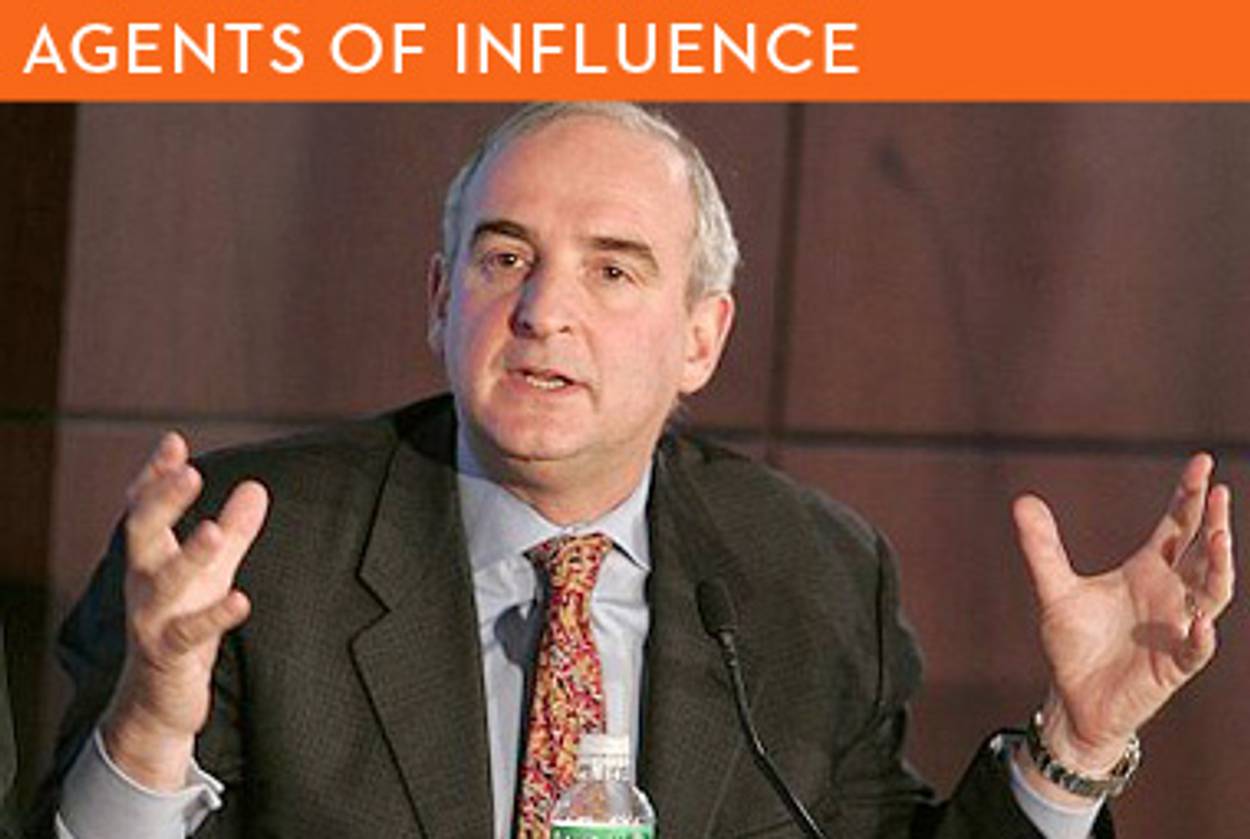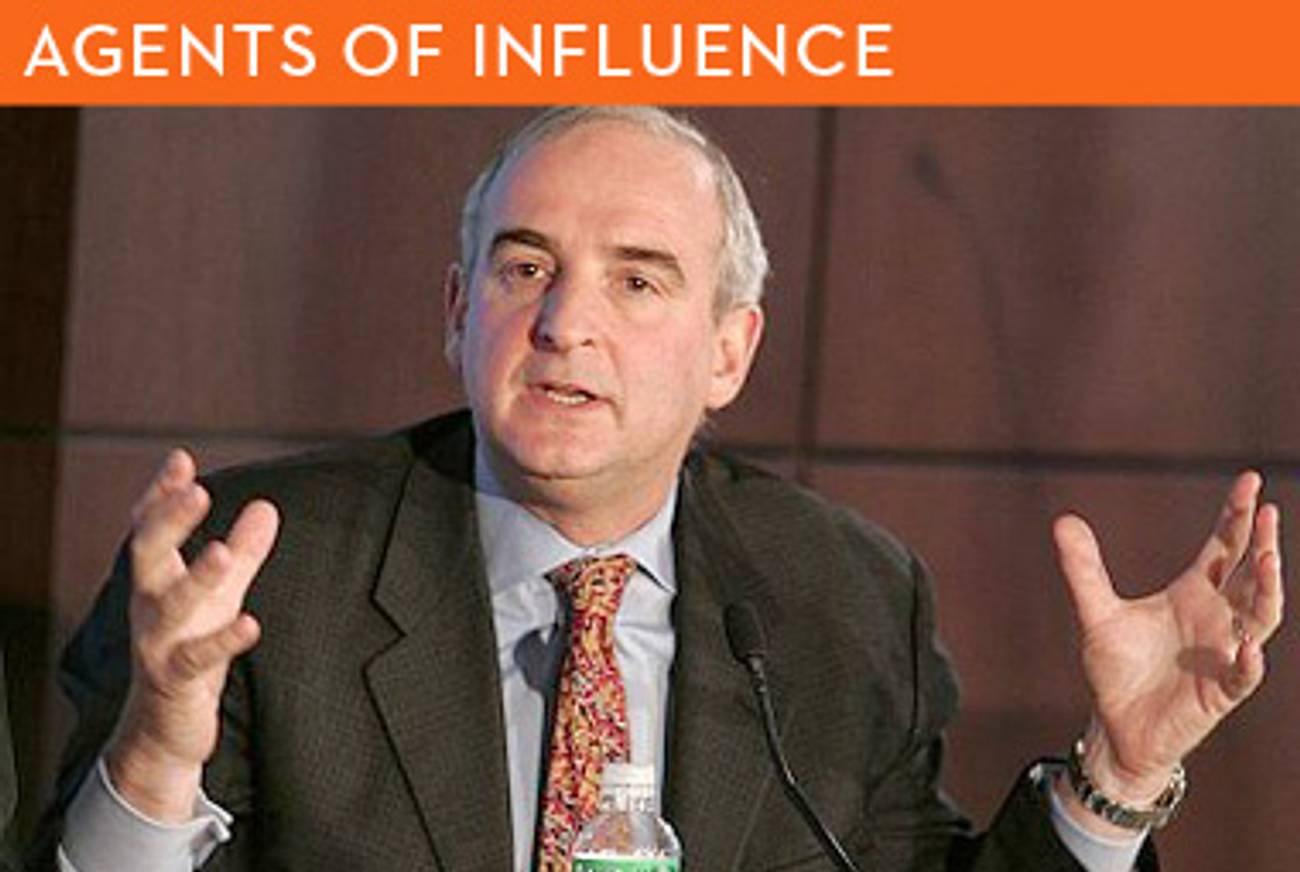High Morals
A condescending moral double standard allows Western thinkers—notably Times foreign-affairs columnist Roger Cohen—to praise the Middle East’s worst regimes




It is a peculiar fact that the region that produced so many of the doctrines that govern our moral life—from the Code of Hammurabi to the Hebrew Bible to the teachings of Christ to the Quran—should cause so many of us to founder morally. But such is the case with the Middle East.
Look around the region: Every bloody government and non-state actor has attracted a cohort of Western fans who feed off of the brand of gore in which those institutions specialize. Some people, like former British intelligence official Alastair Crooke, praise Hamas and Hezbollah as proud resistance organizations. As Michael Young, the Lebanese journalist and author of The Ghosts of Martyr Square: An Eyewitness Account of Lebanon’s Life Struggle, says, “To many Westerners it represents an Arab authenticity, in contrast to the pro-democracy March 14 movement whose members too much resemble Westerners like themselves.” An entire Beltway industry, including former and current U.S. policymakers, diplomats, and intelligence officials, is devoted to rapprochement with Syria’s vicious and kleptocratic regime, the importance of which to U.S. regional policy they wildly overstate lest anyone scrutinize too closely how Damascus targets U.S. citizens and U.S. allies. Then there are the cheerleaders for the Islamic Republic of Iran, for whom the country’s leaders and security services are incapable of any rape or murder so vile that would lose it the support even of fans like Flynt and Hillary Mann Leverett.
And let’s not forget the many hundreds of professional and amateur Middle East analysts who have argued since 2003 that Iraq was better under Saddam Hussein. They knew that the Baathist regime prosecuted sectarian wars against Iraqi Kurds and Shia, massacred its neighbors in Iran and Kuwait, used terrorism as an instrument of its regional and international strategy while pursuing a policy of rape, torture, and murder at home.
The more prestigious the forum, the more this kind of moral blindness to the suffering of others and the norms of justice is presented as proof of sophistication. Roger Cohen of the New York Times recently suggested that Hezbollah should be rewarded for killing former Lebanese Prime Minister Rafiq Hariri. With indictments expected soon in the U.N.-sponsored Special Tribunal for Lebanon, which is investigating Hariri’s assassination, Hezbollah has, as usual, threatened violence in the event any of its foot soldiers are named—meaning, in Cohen’s view, that “It’s time to drop either-or diplomacy to address a many-shaded reality.”
Yet there can be no real stability where the rule of law is subsidiary to the rule of the jungle—a fact no less true in Lebanon than in the United States. The entire point of the special tribunal is that the international community seeks to hold assassins as accountable for their crimes in the Middle East as they would be anywhere else. So, why does Cohen believe that Hezbollah should be granted impunity for political murder and the Lebanese should forget about justice? Because like many other Western observers of the Middle East, he uses the region as a kind of virtual reality screen on which to project a self-congratulatory vision of a world in which superior beings like himself can naturally expect to live under the sign of law, civility, and morality while lesser beings in other parts of the world are quite naturally ruled by violence. “The sort of justice that Westerners demand as their due seems faintly inauthentic to them when it comes to Middle East. There’s a distaste for people who make these demands,” says Young, the Lebanese journalist. “In this view, there is a double standard; justice is variable; if it creates problems, let’s not go all the way, this is the Middle East after all. But if this were the U.S. or Europe, justice would be much more straightforward.”
Hezbollah presents an interesting problem for the Roger Cohens of the world. The organization he wants to excuse for killing a Lebanese politician is also responsible for the deaths of American civilians, diplomats, and military personnel. “According to reports, members of the special operations unit of Hezbollah will be indicted in the Hariri murder,” says Andrew Tabler, a Lebanon and Syria expert at the Washington Institute for Near East Policy. “The U.S. government believes that the late leader of this group, Imad Mughniyyah, was the mastermind behind the kidnapping and killing of U.S. educators, officials, and journalists in Beirut in the ’80s and the bombing of the U.S. embassy and the Marine barracks. In the 1990s we were told this group no longer existed, or was never really part of Hezbollah. But their tune has changed since Imad Mughniyeh’s 2008 assassination in Damascus. Now Hezbollah repeatedly holds him up as a key member of their organization. If for no other reason, the administration is right to support the tribunal because letting these Hezbollah members off the hook would amount to an enormous victory for a group that killed Americans.”
What are the origins of a worldview that would hand over the world to murderers? “For many intellectuals there is a sense of weakness toward the pre-modern,” says Hazem Saghieh, a Lebanese journalist with the London-based pan-Arab daily Al Hayat. “There is a political nostalgia in looking to the past. This manifests itself as a progressive tendency, but it is in fact very reactionary.”
The paradox is that while it is man’s ability to tell good from bad that makes him most human, certain Western intellectuals take the unwillingness, or inability, to do so as a sign of the genius to rise above the small-minded morality of the masses. Excusing Hezbollah may seem like the rational decision-making of a thoughtful intellectual who is observing a society ostensibly different from his own, but in reality the moral universe of the Middle East is no different from in the rest of the world.
It is the parasitic nature of the relationship between Middle Eastern reality and the narcissism of the Western intelligentsia that helps explain the other half of the Middle East’s moral equation: While the murders by Hezbollah, Saddam, and Iran are justified, even celebrated, Israel is censured for actions for which even the United States is normally excused as a matter of course. People like Roger Cohen have no hesitation in holding Israeli soldiers and civilians to a higher standard than he holds the United States. But logical or moral consistency is rarely the point. In the end, the pleasure of holding other people to a higher standard is perversely the same as arguing that they should be held to no standards at all. Both postures elevate the person making such judgments to a godlike place above the antlike creatures whose daily sufferings and misfortunes have meaning only according to the author’s personal whims.
Consider, for instance, Tony Judt, the late historian of modern Europe, who argued that it would be a good thing for the Jewish state to disappear and for millions of other human beings to forfeit their political rights because he was personally frustrated by Israel’s post-1967 political direction. Because the reality of Israel did not fulfill his psychological needs, others were to pay for his disappointments.
In their own minds, Westerners like Cohen and Judt have risen above the facile judgments of their peers in order to understand deeper truths. They are the supermen who rose in place of the idols. However, their problem is that even if the gods did perish, moral judgment was not in their power to take away since is was not them who gave it to us in the first place. These intellectuals who feed their egos with the suffering of others are not gods. They are simply people who are lucky enough to live in the West, where the consequences of their moral blindness are visited on other people, who live far away.
Lee Smith is the author of The Consequences of Syria.
Lee Smith is the author of The Permanent Coup: How Enemies Foreign and Domestic Targeted the American President (2020).